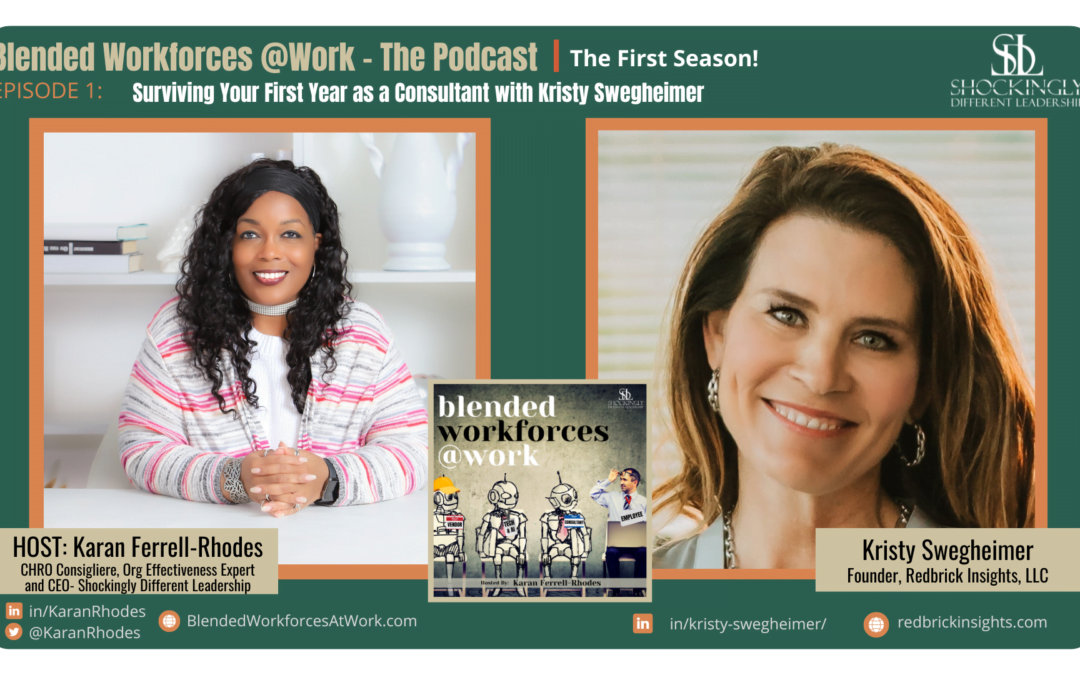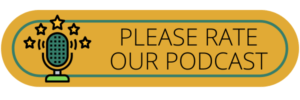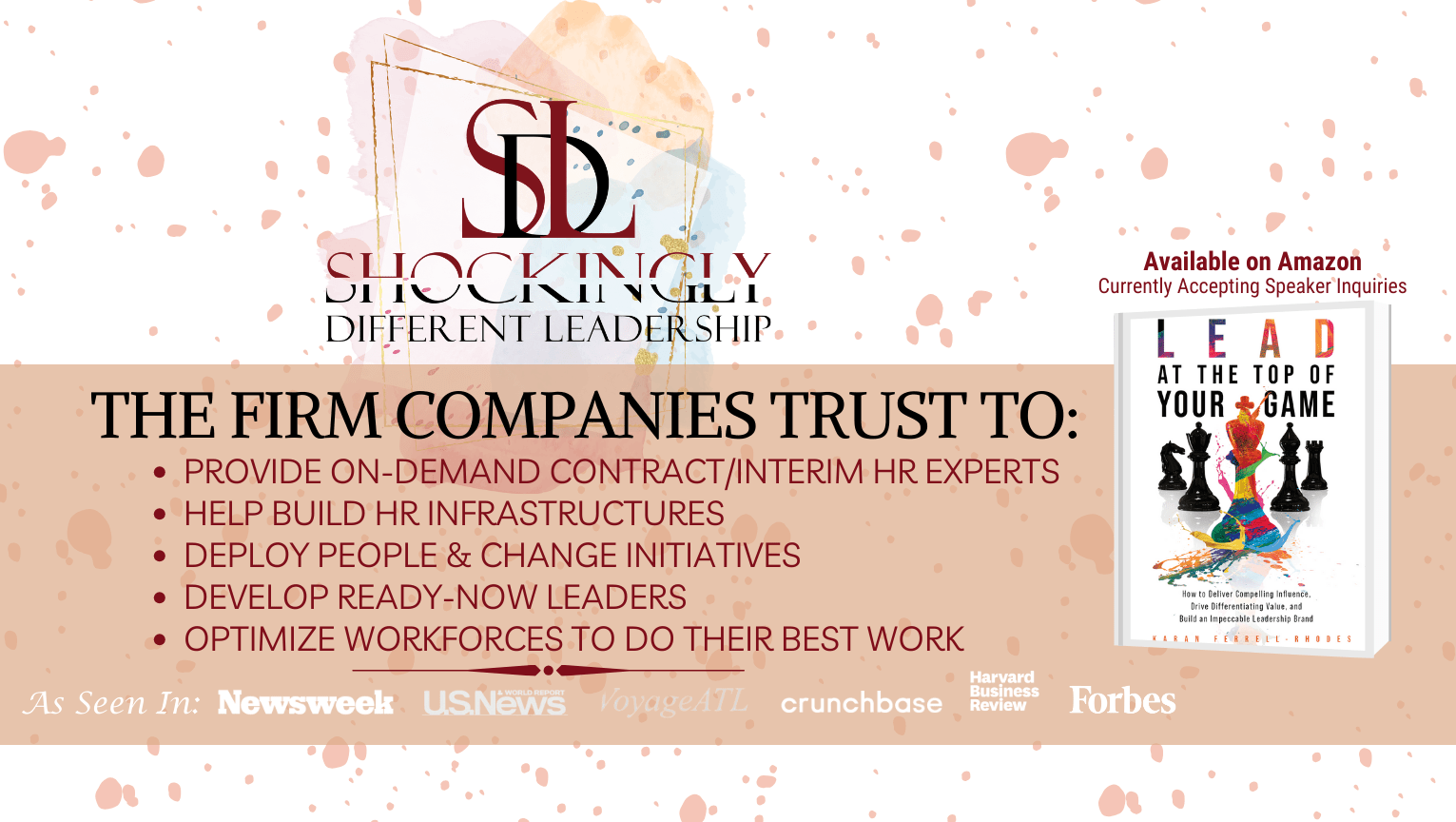IN THIS EPISODE, KARAN FERRELL-RHODES INTERVIEWS KRISTY SWEGHEIMER.
An organization chooses a blended workforce as a strategic approach to achieve its business goals. This strategy combines full-time employees with temporary workers like freelancers, contractors, or part-time workers. The goal of this strategy is to create a workforce that is both flexible and varied, capable of adapting to changing needs and maximizing production.
Kristy Swegheimer has been a progressive leader in high-growth industries in private, founder-led and PE-owned organizations for 20 years. She excels at guiding companies through mergers and acquisitions, creating cutting-edge leadership and talent development programs, and taking on problems directly. In this episode, we discuss how this blended workforce strategy can add value to an organization with Kristy.
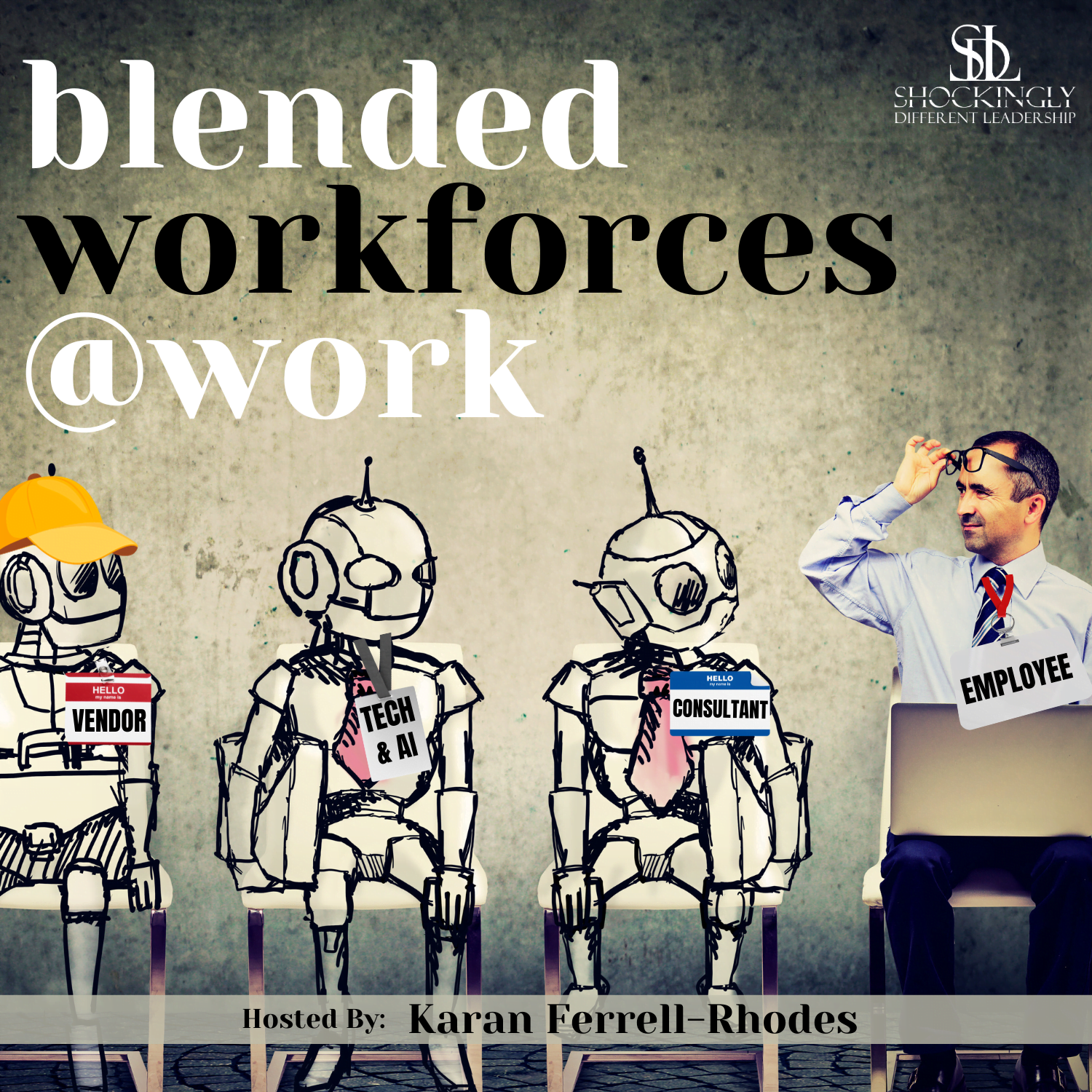
Posted by
SDL Media Team
Rather view our video podcast?

WHAT TO LISTEN FOR:
- How an external consultant can help you while you are running the business?
- Why do you need to bring an HR partner into your organization as soon as possible?
- How to locate ideal consultants for your company?
- How can the onboarding process be a challenge?
- Why is it important to embrace technology as an HR professional?
“[Blended Workforces] are import to opening people’s eyes [about alternative workforce strategies]. You can’t just do only what’s been done before.”
FEATURED TIMESTAMPS:
[04.24] Kristy’s CHRO background.
[06.54] The value HR brings to a company.
[09.20] Kristy on locating ideal consultants.
[12.13] The difference between a corporate team environment and starting up your firm and consulting.
[16.00] Redbrick Insights and their services.
[18.54] Business development and what makes Kristy different from other consultants.
[24.06] On-boarding process and challenges.
[26.24] Signature Segment: Kristy’s LATTOYG Tactics of Choice: Leading With Stakeholder Savvy.
[27.12] The importance of using the right data.

ABOUT KRISTY SWEGHEIMER:
Kristy Swegheimer is a Chief Human Resources Officer and a human capital consultant. With over 20 years of leadership in private, founder-led, and private equity-owned companies within high-growth industries, she is competent in guiding companies through mergers and acquisitions, creating innovative strategies for acquiring people and training leaders, and proactively addressing problems. She improves employee engagement, productivity, and corporate outcomes by coaching individuals to reach their full potential while also constructing teams and encouraging cooperation. Her career started in employment services in the late 1990s, and she progressed through leadership, recruiting, and sales. She learned from this experience how crucial it is to approach business leaders as clients to establish strong alliances and transform HR’s function from administrative to strategic.
She is the driving force behind Redbrick Insights, a capital advisory firm that offers CHRO services, HR consulting, and talent acquisition services. Her purpose for creating her company is to offer solutions that give businesses strong foundations by aligning their workforce. Her skills and expertise expand on organizational design & development, HR policy & procedure development & implementation, talent acquisition, performance management, leadership development, and many more. She looks forward to meeting people and exploring how they can create the way for human capital success.
LINKS FOR KRISTY:
LinkedIn – linkedin.com/in/kristy-swegheimer
Website – redbrickinsights.com
ADDITIONAL RESOURCES FOR YOU:


Episode Sponsor
This podcast episode is sponsored by Shockingly Different Leadership (SDL), the leader in on-demand People, Talent Development & Organizational Effectiveness professional services that up-level leader capability and optimize workforces to do their best work.
SDL is the go-to firm companies trust when needing to:
- supplement their in-house HR teams with contract or interim HR experts
- implement leadership development programs that demonstrate an immediate ROI and impact on the business

Click the plus button on the tab to access the written transcript:
EPISODE 1 | Surviving Your First Year as a Consultant with Kristy Swegheimer
Kristy Swegheimer 00:00
The whole blended kind of workforce idea. If you research kind of what a talent acquisition strategy is,you and I know it’s buy, build, borrow, and bridge,right? You pick up pick a lane, if you will. That’s taught in a lot of like places, but the blended is really bringing all of those things together, which makes a very successful talent acquisition strategy.
Karan Rhodes 00:20
Blending workforces are one of the hottest talent strategies today, where employers are using a mix of traditional employees with external resources like independent contractors, coaches, consultants, vendors and technology solutions, all in order to enhance competitiveness, ensure cost flexibility, and expedite business goals. But how are the successful companies infusing blended workforces into their business strategy? And what are the critical success factors and pitfalls to avoid during implementation? And on the flip side, what does it really take for suppliers to improve their chances of finding and landing contract opportunities? The devil is in the details, my friends! I’m your host, Karan Ferrell Rhodes, and it’s time to get smarter about Blended Workforces at Work. Hello, everyone. Welcome to today’s show. We’re absolutely thrilled to feature Kristy swag Heimer, who is the founder of red brick insights, which is a human capital advisory firm that offers fractional Cedros services, HR consulting and talent acquisition services. And before leading red brick insights, Christie was the former Chief Human Resources Officer at Qualis, which is a power and energy consulting firm. And Kristy has experienced both sides of the blended workforces table. So we’re so excited to hear her insights on today’s show. So welcome to the show, Kristy.
Kristy Swegheimer 01:50
Oh, thank you, Karan. I’m so excited to be here. I appreciate that.
Karan Rhodes 01:53
We are just absolutely thrilled to have you and gain your insights on this whole crazy world and blended workforces. Yes, but before we start getting into the nitty gritty, for as much as you feel comfortable, would you mind giving us just a sneak peek into your personal life or hobbies? Yeah, sure.
Kristy Swegheimer 02:14
I am the mother of two children. So my oldest son is 24 My eldest daughter is 13. She’ll be she’ll be 14 soon. So
Karan Rhodes 02:23
You’re not old enought to have a 24 year old! Oh my God, you look fantastic.
Kristy Swegheimer 02:29
Yeah, I had her when I was two. So
Karan Rhodes 02:32
Exactly!
Kristy Swegheimer 02:33
Yeah, he’s wonderful. He’s actually in the energy space too. But my daughter my free time is really spent with her. So she is I call myself her day to day Uber driver. I’m taking her to obviously school and then she plays volleyball. So club volleyball, which keeps us very busy traveling. So every weekend, it’s volleyball here there somewhere else. So I don’t have much personal space other than I love to read some of the books behind me, but I am a big reader, whether it’s listening to books and audio tape in the car or reading care at home, if I’m not traveling with her.
Karan Rhodes 03:06
Oh, I love that. Well, so we’re sisters from another mother in that sense, because yeah, I absolutely am a voracious reader of a both books and, and as well as like online, specially like magazines or people that cover certain topics. I just love to understand new perspectives. So it sounds like you do as well.
Kristy Swegheimer 03:29
I mean, knowledge is power, right? But but it it’s true very much so.
Karan Rhodes 03:34
That’s wonderful. Well, let’s get started with talking a little bit about when you were CHRO, and I’ve been that as well. And that’s a whole nother world within itself. Because I always love to say I’ve never to this day, if after over 20 years have seen an overstaffed HR function.
Kristy Swegheimer 03:57
Never.
Karan Rhodes 03:59
Always are made to do with what we have within our resources and budget. But many times when we’re able to get a little bit of extra budget, we’re bringing in a few consultants to kind of help bridge the gap in our capacity. So I’m just curious in your CHRO, or a background, Were there ever any times that you had to consider or bring in consultants of any type? And if so, what were some of your examples of doing so?
Kristy Swegheimer 04:24
Yeah, yeah, several times. I think that there are certain times in places where it just makes complete sense. So one part is, you’re in the day to day, right. So you can not see sometimes the forest for the trees. And so I think there’s always a good opportunity to have somebody come in on a regular basis and maybe just kind of do an audit, say what’s going right, what’s going wrong. I mean, think about the pace changes, right? The pay transparency in every state now that’s required. If you’re in every state of the US and a global company. Are you keeping up with those things? No, I’m not saying you’re not of course, every person tries to do everything they Ken but those laws changed so frequently, that I think having an external set of eyes, look at some of that every now and then is a good, it’s not a bad on you, it’s a good on you that you’re protecting kind of what’s going on in the company, that you’re not taking your eyes off of it. Other times we’ve used consultants for for acquisitions, especially depending on what side of the house you’re on. So I use them on both sides. So whether you’re being acquired or getting acquired, if you’re being acquired, one of the best ways in my experience to use them is because you still need to be so focused on the business. Operationally, you have to keep that business running. The whole idea, especially in a service, business companies are buying service businesses for people more than anything, right? They’re people running business, talent drives businesses. So if you take your eye off of that ball for a little while, things will start to happen. So an external consultant can really help guide through those pieces. Think of change management, how you’re communicating how often you’re communicating, if you’re spending all of your time doing that, are you doing everything else that is important to the organization. So having that right balance, I think is very important.
Karan Rhodes 06:05
Oh, I love that you’re, you’re so spot on. And that had been my experience as well. You always need additional assistance, but then, and then we have a whole division that focuses on mergers and acquisitions, because it’s such a hot spot. And where we seen in the market, when I worked with a lot of private equity firms, they’re super smart people that are doing fantastic business deals, but they sometimes don’t think about the people perspective until they’re almost signing on the dotted line. And we’re brought in so late in the game, and then they want us to create miracles where everybody’s singing Kumbaya once, once the merger happens, and most of the organizations that are trying to figure out cultures and how to do business and what have you.
Kristy Swegheimer 06:51
Yeah, true. I have seen…
Karan Rhodes 06:52
Have you seen this as well?
Kristy Swegheimer 06:55
I’ve seen that. And what I have also seen too, is a little bit of a shift, there’s an I work with a private equity, a couple of private equity companies, that’s a lot of the work that I do. And I’ve seen them really say, Okay, we’ve seen it go well, before we’ve seen it go wrong. And so now I feel like a lot more paying a little bit more attention thing, the sooner you bring in your HR partner, the better. And just from a again, I look at HR as when they’re sitting around the table. HR is not the one saying I’m protecting something behind me. Operations and sales, they’re always kind of at each other, forgetting that coverage for the people behind them. HR doesn’t do that their coverages for the entire company. So having those people there sooner, I feel like it’s becoming a much more normal focus. As long as those HR partners are very business savvy and focused there, they’re going to be brought in a little bit sooner, but it is a huge impact to have it there. Again, if you’re buying a company, you’re buying the people that are in it. So if you’re you’re taking your eyes off of those things, it’s going to have a bad impact. And I think enough companies maybe have seen that that need to changing their tune a little bit.
Karan Rhodes 08:02
Absolutely. The ones who have experienced that are changing their tunes, the ones that are newer into the space are, I guess learning as they’re going and getting more open to it. I know, for our firm, we get a lot of referrals from partner organizations, like benefits companies and things like that, that they’re in, they’re trying to help. And they’re like, Hey, we don’t do the full, HR functional Gambit, we just are in our own little sliver of the piece of the pie here. And you need to bring on somebody else that has that expertise. So we might be seeing that as well.
Kristy Swegheimer 08:37
Yeah, for sure. I like to think of the content, the human resources and the human capital kind of separately to like, I have this thing I say human resources is like the price of admission, like you’ve got to get that right before you get to move on. Right? Hey, correctly, the benefits, the compliance, the things that is just very much expected in running a business, you’ve got to do those things before you get to do the human capital side. Right. And so you’ve not got somebody figuring that out? You’re gonna come hell pretty quickly, so…
Karan Rhodes 09:05
Absolutely. So Christie, I’m curious, in your CHRO days, how did you find or source the ideal consultant that you were looking for based on the need that you have? How did you locate them?
Kristy Swegheimer 09:20
It was always through referrals. It was the contacts and connections that you had either through the industry, right, there’s Sherm networks that maybe people are attending or other networking things. I think that’s important for HR professionals as a whole. They don’t always think of networking the same way as other people in the business do, but they definitely should. For sure, but that’s how I found them was through networking opportunities, and then we’ve got a referral or you’ve met somebody in a past life that did something and they worked out well and continued on or if it wasn’t for theirs, they would refer them to somebody else, right?
Karan Rhodes 09:55
Absolutely. It’s all about our networks.
Kristy Swegheimer 09:57
Yea, it is.
Karan Rhodes 09:57
That’s all it is. And I found I mean, everybody has that tendency I find, but particularly in the HR arena, because I’ll just speak for myself when I was a CHRO, the things we dealt with were so confidential and sensitive, that I didn’t personally feel comfortable going on one of the marketplaces and trying to find anybody.
Kristy Swegheimer 10:23
Right!
Karan Rhodes 10:23
I needed to know that the person I’m bringing in is expert, they understand confidentiality, integrity, they knew their think their, their stuff, if you will, and to have, if I’m gonna put my name behind them coming into the organization, I needed to have a comfort level. But that was me, that was Karan…
Kristy Swegheimer 10:44
I very much agree. I mean, it is, again, it is your name, it is your reputation, if something goes wrong, you’re going to be the one that has to take that yours. So 100%, you got to have the confidence in whoever you’re kind of bringing on to help you through things that they’re going to be the right person. And it’s not always just again, to your point, you can’t go to the marketplace, because what’s on a piece of paper could be great. And their experience could be wonderful. That doesn’t mean they’re going to be a fit for that company, though. That’s right. That’s right, just like hiring them don’t employee the cultural fit there makes a difference? Are they gonna adapt to the way that we run business? We run our business this way, right? It’s not government run, it’s this run, right? There’s, there’s a difference in some of those things. So it’s, it’s very much a comfort level with how they’re going to be successful.
Karan Rhodes 11:32
That’s right. It’s all about the dynamics of the client and their needs. And you knowing that having that insight so that you could provide value. Yeah, I also remember that, oh, gosh, I lost my train of thought just that quickly. I was gonna say that not everybody who comes out of corporate can hang a shingle and be a great consultant. There’s the difference between having an infrastructure of employer in place and working within that culture and dynamic that you’re very familiar with, versus going and starting up your own firm and consulting. And not having that. Yeah, do that. What’s your thoughts on that?
Kristy Swegheimer 12:14
So I will tell you one thing, personally, I do miss it a little bit, I miss the the the corporate team environment, we had a staff of 15, and our HR department like that you miss a little bit of that and growing something. But the other aspect is, is you get to have a bigger impact on multiple companies, right? So you get to come in and get to see those things. You’re not going to be fully as integrated, of course, but you want to be looked at as a trusted partner. And then you get to see the things that you can do much quicker. Right? You can you can see those things and in in different environments. I started actually in the staffing industry back in the 90s. Like I was knocking on doors selling staffing services. To like a hot pet back then those kinds of services. Yeah. So when I when I transitioned into corporate from leaving that for 1213 years, I did that transition to the corporate, that was a huge change to going from being a vendor, right? To try to be the corporate HR person. And I remember the initial transition being tough, like I wanted to say, okay, no contractors, I’m gonna just stand my ground. And we’re gonna do it all internally, and we’re not going to use anybody. But that backfires. Again, you can’t do it all. That’s part of the talent acquisition strategy. And I mentioned to you, but the whole glinted kind of workforce idea. Have you read research kind of what a talent acquisition strategy is you? And I know it’s by Bill borrow and bridge, right? You could you pick up pick a lane, if you will, that’s taught in a lot of like places, but the blended is really bringing all of those things together, which makes a very successful talent acquisition strategy. So you have to get over that hump and kind of do both sides. So I’ve seen both sides. And I think now then coming back to the consulting side, although it has challenges, it’s also been hugely rewarding because you can take the what’s worked at different places, right? What’s worked in a corporate environment, what you know, was worked in a consulting environment and adapt each of your clients that way, too.
Karan Rhodes 14:12
Oh, I love that. Okay, inquiring minds want to know, I got to go back to your knocking on doors days. What was that? Like? How did you approach trying to get in front of decision makers when there were 25 million right behind you trying to do the same thing?
Kristy Swegheimer 14:30
Oh, it was so
Karan Rhodes 14:31
What was your secret sauce?
Kristy Swegheimer 14:32
I don’t know that I had a secret sauce other than I was probably diligent. Right. I’ll give you one quick example there was back in what I was truly selling selling and you were it was literally cold calling you were knocking on doors and businesses, whether it be a warehouse or an office building or whatever, knocking on doors, and there was one this is gonna sound so silly because it kind of was so many years ago, but strategy that I had where for 10 weeks. I had 10 different clients that say per prospects 10 prospects for 10 weeks, every day on the same time at the same day, I would go with something different to the gatekeeper, she would get something or he would get something whoever sitting at the front. Now, again, it could be a candy bar that says something silly or whatever, trying to be creative to get their attention and something also for that decision maker, so one for the one for them, leave them for 10 straight weeks.
Karan Rhodes 15:29
Well, that set you apart, I bet!
Kristy Swegheimer 15:37
It was rewarding. But also it was it was tough back in those days. I’m sure it still is today, too. There’s so many still staffing companies. They’ve just expanded so much. It’s not the same as it once was, of course.
Karan Rhodes 15:49
Yeah, I can imagine. Yeah. Well, why don’t you share a little bit about Redbrick Insights? What do you all do? How to use serve as clients? What is your specialties?
Kristy Swegheimer 16:00
Yeah, so I areas specialty is broad, I like to think of myself as very much a generalist for sure. But the things that I love to do are the human capital side of the space for sure, I like to work with companies who already have a very established HR team, they just need that extra view, they are not enough to have a CHR o level. So I can come in and help them identify where their areas where they can exceed and different things, you know, have a fully aligned their people operation strategy with the organizational operations, goals and initiatives, and ways that we can do that. Whether it be a talent acquisition strategy on the front end, or a training and development piece written the way that you exit people are thinking about our goals, what is it who are p as a purpose driven organization, and trying to make those connections for their HR teams, and then putting in programs to help them along the way so that they again, don’t have to take their eye off the ball, they can still move the organization forward. Great examples, again, training and development program, right thinking of bringing in a skills based hiring because it is a hot topic, right? Competency Based hiring, how are we hiring for different things that aren’t just degrees, and helping them think through that and put a strategy around it to start increasing that return on that. So it really anything a lot of times I’ll work with private equity companies who will say, hey, could purchase this company, can you come in and help us evaluate maybe something in the in the team or going to HR audit is everything kind of working to the to the way that it should be? Because this team has been working diligently and maybe there’s an I will say, I’m not here to take their jobs, right? That’s the one big kind of connection is I’m here to support and help them succeed in any which way that they need help with doing. So putting any of those programs in place are working to make sure that they’re fully aligned for the future.
Karan Rhodes 17:48
Oh, love that. And I know you have a team that works with you. But do they? Do you find that your clients mostly need help on strategy and they rely on their internal teams to execute? Or do they come to you for both?
Kristy Swegheimer 18:04
So far, both. I’ve been again, it’s only been a little less than a year that I’ve been out on my own. But I’ve been very blessed, I would say to have good relationships, that once people knew I was on my own, I said, Hey, you know what, your I see that you’re out here. Can you kind of help us come think through a strategy? Or can you help us figure out how to execute what we’ve already said we could do? So it could be it’s been both so far. And I don’t turn away business today.
Karan Rhodes 18:33
We can’t no, we don’t turn away visitors. We try to find a way if possible. And then. So thank goodness, you’re not having to I don’t think knock on doors at the same time every day to try to get that business. How are you thinking about your business development outreach? What are some of the ways that you’re focusing these days with your new firm?
Kristy Swegheimer 18:54
So I will say that’s tough too. Right now, again, it’s only been referrals that have come to me, I’ve not had to really sell too much. But there’s things like this, right? There’s podcasts like here, you’ve got a great network of people that follow you. So there could be something that comes from that as an example. But today, it’s tough to manage, of course, the word coming in, and then how much you can network, because for me, it’s really more networking than it is truly selling. If you know there are companies out there that do human capital or human resources consulting a census, or there’s plenty of them. So to sell against something like that is a little tough. But for me, it’s so it’s more, you know, letting people know who I am. I think that what makes me different from a consultant is that I spent 20 years doing the role, everything from and I grew to separate companies from 100 to almost 1000 employees over 10 years to different times. So having that experience and knowing that growth takes a specific kind of thought process, and a business mindset, and so like, saw myself that way, and then the team that I have that works With me, that’s what I have for them to write, they’ve got to come from the business, they’ve got to understand what it’s like to work in a in those roles in order to truly have an impact. I don’t think coming to sort of college and heavy consulting, I’m sure that there are people who do that do that. Well, I guess I’m just more Premier or specialized over here. So I think that this works better. But
Karan Rhodes 20:22
I agree as well, I mean, because some those that are coming out of like MBA school or whatever to go into your McKinsey’s, and the world, they have detailed frameworks that they’re being taught that they’re just reapplying. But I think the world of people strategy is, is so dynamic. So dynamic, really, you’ve got to understand, like you said, the, the core of the human resources function, but then deeply understand the business as well, that you’re trying to help serve, and combine the two in a way that’s a win win, right for the business and your company, as well as their employees and clients. So it’s, it’s a lot on our plates, right?
Kristy Swegheimer 21:08
Yeah, it is, it is, which is why the whole the blended workforce, and you getting this out there more is just so vitally important, right? It’s opening people’s eyes, we can’t just do only what we’ve done before, it’s not going to work, you’ve got to have a different mindset and an open mind, even to the point of your we didn’t talk about too much the employees that you hire, whether they be right out of school, or retirees that’s at both levels that might be interested in the gig work, right? Think of a business strategy that if you can’t hire and retain certain levels all the time, not everybody can come with 10 years of experience in something, but they might have 20 years of experience in something and they want to exit the workforce soon. So maybe that’s somebody that we keep on as a short term, or in my old company, we call them on call workers. But they’re basically gig employees who get to pick and choose the work that they get to do. It works on the end side, and it works on the entry side too, right people entering the workforce, let them try out some things, it’s again, just got to be a little bit more open minded about the different opportunities and workforce strategies that are out there to get it to go to the next level.
Karan Rhodes 22:18
You’re so spot on. And I’ll just share I had a potential client reach out last week, we’re really promoting this new podcast. And she said, she’s a CHRO for a company that has over 5000 employees. And she said, Oh my gosh, I stumbled upon the advertisement for your podcast. And she said just had to reach out. And I’m appreciative that you even responded back, she says, but I’ve been trying to get my business leaders heads around a blended workforce Strategy for years, and I searched for consultants and nobody was talking about it. So she says I’m gonna make everybody sign up and listen to your new podcast.
Kristy Swegheimer 22:55
That’s awesome.
Karan Rhodes 22:56
So they can learn a little bit more, and it hopefully be a little bit easier. So
Kristy Swegheimer 23:01
That’s awesome. yeah, we gotta educate.
Karan Rhodes 23:03
It’s gotta educate, educate is extremely important right now. Yeah. So I’d also like to ask you this sometimes challenges when you have your own firm, kind of getting on boarded, with new clients, meaning having them to get you into the right tech systems that you need to have exposure to to help them appropriately or get you into their vendor or payroll, not payroll vendor, or procurement systems and all of that, once you sign on the dotted line, how do you get that consultant or that firm? Effectively? onboarded? So I’m just curious if and then you’re kind of new, newer into to your firm. But have you faced any challenges yet? May not because you’ve, you know, gotten so many referrals, and they kind of know you, but have you faced any challenges? Or is there anything that advice that you have for other consultants like yourself, should make sure that they ask for their their clients to do to help onboard them appropriately?
Kristy Swegheimer 24:06
I think I haven’t really found this to be an issue for me. Yet, I could see how it could be an issue though, which is really, you got to get integrated a little bit, right, I’ve got to get to know the team. And my clients so far have been very open and allowing me to come in and spend time with the team interview, the leadership team, for lack of a better word, right, kind of like get integrated that way, not only with the HR team, but with their leadership team too. But I think that could be a challenge, especially as work gets busier and busier. They don’t want you to come in, they could think of you as your consultant. So you should be able to just come in and do it. But you can’t do what we do effectively unless you know the people and the business that you’re you’re getting involved in. So I can see that as a potential issue. Again, knock on wood, has not happened to me…
Karan Rhodes 24:54
And we’re not going to claim it for you.
Kristy Swegheimer 24:56
But I think that could be an issue. I think the only way to overcome Tom, that, again is to continue pushing, you’ve got to get integrated with the team.
Karan Rhodes 25:04
Absolutely. Absolutely. Well, before we let you go, because I think we’re rounding out on time, gosh, I could talk to you all day Kristy. But one of the questions we’d love to ask all of our guests is I wrote a book on leadership execution and some of the things that the world’s most successful leaders do. And it was came out of research that I commissioned a few years back. And we love to ask which of the seven tactics that we talk about really resonated for you, and you were so kind to share that leading with stakeholders savy kind of resonated with you. And for my new listeners, leading with stakeholder savvy is all about assessing the interpersonal dynamics that you’re in, in the situation, and adjusting, so that that you are being very sensitive and interactive with others that you’re speaking to, and in a variety of situations. So for instance, you might have a certain type of approach when you’re selling a widget versus when you’re at happy hour with your colleagues and friends versus when you’re at a client and you’re trying to consult with them. So it can be kind of a world it’s kind of a sister tactic, emotional intelligence. So Kristy, curious minds want to know, why did leading with stakeholder savvy kind of resonate with you a bit.
Kristy Swegheimer 26:25
So I think it resonates with me mostly now as again, I’ve transitioned from the corporate space into the consulting space in that the people that I’m partnering with are already heads of HR. And I need them to feel comfortable and confident that I am there to support them. And again, not take their roles, right. I can’t do what I’m doing if we’re always kind of in competition with each other. But once we get connected, we can go much further. So kind of being able to read that and being connected and saying, Okay, let’s let’s get on the same page, so that they know I’m again, here to support not take.
Karan Rhodes 26:55
Absolutely, absolutely. Yeah. And I’m just curious, are there any technology or apps that you love to use in your business now, or that you had loved to use when you were back in the corporate arena?
Kristy Swegheimer 27:13
I mean, I’m a big fan of data data, I think you can, if you can lead with data, you can capture different minds than if you lead with a story in different ways. So I think having the right HRIS system is crucial. Having the right person that knows how to pull that data out to right. So whether that is a consultant or you have an HR is manager, somebody technical to be able to get the right data, because that’s going to help you really drive a story and know what’s right or what’s wrong. But I’ll say today, too, I mean, there’s all AI tools out there. And I think that again, you have to not be scared of AI as HR professionals, you have to embrace that as much as you can. And so I have researched all kinds of things. And there’s certain ones that I use on a kind of more frequent basis. We tried to do you ever based out right, but those are great tools that can help augment things that you’re doing. Now, I don’t think they will ever replace HR, I don’t think there’s a tool that’s going to replace HR at all. It’s such a people driven organization, but how can you automate some of those little things that you’re doing that take up time, and that needs to be explored and continuously managed, again, different organizations have different rules for it. So one of the things I see as a an opportunity and a worry for HR professionals is making sure that they’re adopting the right policies around it. As they’re integrating and using these things. Just make sure that you’re protecting the information of your employees and the company, so that it doesn’t become an issue later on a cyber issue, if you will, or who knows that it’s still authentically theirs. But you have to be able to use all of them. But I think using the right data is going to be critical. My favorite Vitoria system was ulti pro eight UKG by found them to be the US most user friendly and my own experience. But there’s plenty of other ones that are that are great, too. It’s just my preference.
Karan Rhodes 28:58
There’s a million of them. So yes, and all that you just said and I think also HR leaders are going to be called upon to help the business leaders also think about AI as effects on their workforces the rest of the workforce is and all the different specialties because you name of job function, there’s an AI tool out there for 100%. They’ve got to think help them think through best practices and in lowering risk as well for the organization, to your point about compliance and how do you protect data all of that is going to that’s what’s gonna keep HR in business for many years to come.
Kristy Swegheimer 29:37
Right. AI might eliminate one job but it’s going to create another staying protected. People just need to really, I think embrace it, because it’s not going anywhere.
Karan Rhodes 29:47
Not at all. Not at all. Well thank you so much, Kristy, for the gift of your time. This has been absolutely fantastic. We really appreciate you and all that you’ve brought insights you’ve brought to the table today.
Kristy Swegheimer 30:00
Thank you Karan. It was a great time I loved it. I appreciate everything that you’re doing for the for the HR organizations.
Karan Rhodes 30:06
Thank you. And thank you also listeners for listening in to the to the blended workforces at work podcast. Also know that we have a second podcast called the Lead at the Top of Your Game podcast that is focused on exemplary leadership. So make sure that you check that out. You can find them on any podcast platforms of choice. Thanks again and see you next week. Well, that’s our show for today. Thank you again for listening to the Blended Workforces at Work podcast. You can check out the show notes, additional episodes, bonus resources, and also submit guests recommendations on our website at blendedworkforcesatwork.com You can also follow me on Twitter, LinkedIn, Instagram or YouTube by searching for the name Karan Rhodes with Karan being spelled K a r a n. And if you like the show, the greatest gift you can give would be to subscribe and leave a rating on your favorite podcast platform of choice. This podcast has been a production of Shockingly Different Leadership, a global consultancy which helps organizations execute their people, talent development, and organizational effectiveness initiatives on an on demand, contract, fractional, or project basis. Huge thanks to the SDL production and editing team for a job well done. Bye for now.

Want to be a Podcast Guest?
We’re always looking for great podcast guests to join Karan on the BWAW podcast.
Check out our guest qualifications and submit our brief form to be considered.
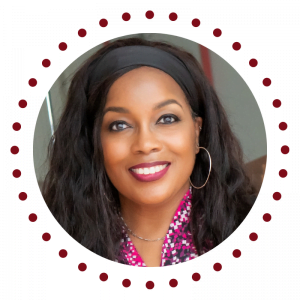
Want Karan to be Your Podcast Guest?
Karan loves being a guest on podcasts, as her schedule allows. Topics most commonly requested:
- Blended Workforces & the Gig Economy
- Critical Execution Tactics of High-performing Leaders
- Entrepreneurism & Leading Your Business

Want to be a Podcast Sponsor?
We will promote your brand with your choice of either a live read or recorded audio ad on an upcoming episode of our podcast.
All sponsorships come with a featured spot on show notes pages.
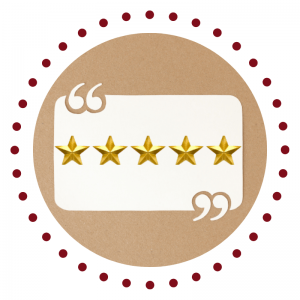
Like the Show? Please Leave a Review
Karan runs on tea, cocktails and kind words ![]() .
.
If you like the show, it would mean the world to her if you left a quick review.
Your word is golden, so a HUGE thank you in advance!

#KeepInTouch
via our podcast alerts
Subscribe now to discover why thousands of monthly listeners who are passionate about doing their best work prioritize time each week to listen to the Blended Workforces @Work podcast.
#AboutSDL
Shockingly Different Leadership is a human capital professional services consultancy that provides organizations access to the best consulting expertise in the areas of Talent Development, Organizational Development, and Human Resources – on an on-demand, project, or contract basis.
#WhereToFindUs
MAILING
4480-H South Cobb Drive
PMB 219
Smyrna, GA 30080
PHYSICAL
2121 NewMarket Parkway
Ste. 108
Marietta, GA 30067
#ContactOptions
Customer Service Email:
service@shockinglydifferent.com
Call or Text:
770-384-1103
#Office Hours
MON-FRI
8:30 AM – 6:30 PM
Weekends By Appointment

